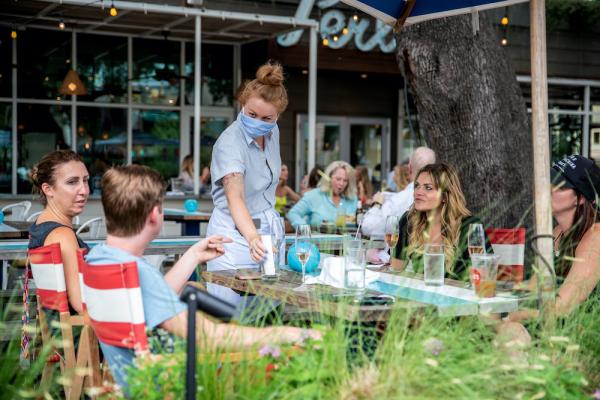The theme of the daily COVID-19 task force press briefings in March was: We can end it if we all do our part. That’s when I felt pretty confident that we were in trouble.
As stay-at-home orders and mask requirements began going into effect around the country, I began seeing comments online that felt familiar.
“You can’t make me wear a mask!”
“I can go wherever I want to! This is a free country!”
“Some people are just going to have to get sick and die. I’m sorry, but that’s how it is.”
I read those words and heard these in my head:
“You can’t make me lock up my gun!”
“I should be able to buy a gun whenever I want! This is a free country!”
“Some people get shot and die. It’s a price we pay for our freedom!”
Then it hit me. All of it felt familiar because I’ve been living another version of it for years.
Instead of following the way of Jesus by laying down our own personal comforts for the sake of others, we have once again chosen to think of ourselves above all else, a pattern that will inevitably be our downfall.
As a shooting survivor who works to educate people about gun violence and advocate for gun reform in the United States, I have spent years trying to convince people that it is worth making personal sacrifices for the sake of the collective good. That’s how I knew that if surviving this pandemic was riding on the event that people would willingly choose to give up a small amount of personal freedom to protect someone else, we were already in a losing battle.
In the beginning, it sometimes felt like we were all in it together: Amateur sewists dusted off our sewing machines to make masks for front line workers; working and at-home parents shared tips for surviving the long days stuck inside; Uber thanked us for not riding; Dove told us that courage is beautiful; and even Congress managed to work together to provide momentary reprieve for people and businesses across the country. It seemed like we might be able to kick the coronavirus to the curb with a few weeks of shuttering businesses, closing schools, and staying home — for those of us lucky enough to have that option. But after a month, when people realized it was going to take more than a couple weeks of isolation, many simply got bored.
Instead of asking, “How can I love my neighbor?” too many now ask “How does this affect me?” Gun reform advocates aren’t surprised. For years we’ve tried to show people the evidence that more guns equals more gun deaths, that more safe storage equals fewer unintentional shootings, that limitations on gun purchases save lives, and that requiring convicted domestic abusers to surrender firearms will save the lives of women and children. And yet, the response is that these restrictions infringe on personal liberties and freedoms, and that protecting these freedoms comes with inevitable casualties. This belief translated well to COVID-19 as people decided that the most vulnerable — the disabled, elderly, immunocompromised, front line workers — would just have to get sick and die in order to keep the economy going and return to normalcy.
People in underserved communities, largely communities of color, see more everyday gun violence than any other group of people. Now, these same people are disproportionately affected by COVID-19, with less resources for testing and limited access to health care professionals who will believe them when they say they are sick.
Our ambivalence is the same for schools, which should be safe havens for teachers and students. We expect our children to deal with the consequences of our inaction and our teachers to protect our kids from bullets so we can protect our own selfishness. We spent months calling teachers heroes for going above and beyond their job descriptions to serve our children on Zoom calls, and now we call them selfish for being afraid to return to the classroom.
So I’m not surprised when it seems as though people aren’t willing to be uncomfortable or inconvenienced in order to save lives, protect the vulnerable among us, or see the needs of others as more important than their own.
The resistance to wearing masks, the defiance of social gathering limits, the distrust of anyone who asks someone to sacrifice an inch of personal freedom — all of this is a manifestation of how intertwined American Christianity has become with the American ideas of individual freedom and personal liberty.
When I read the word of God, I read Jesus telling us to consider others more important than ourselves. I read his words explaining that to inherit eternal life, we must love and serve our neighbors. I read him telling us that we should attempt to outdo one another in how much we care for each other, that we should do good without expecting anything in return for ourselves, and that the greatest love is laying down our lives for our friends.
I see nothing about the importance of our personal liberties. I see nothing about the importance of individual freedoms. The only freedom I am taught about in the Bible is the freedom we have in Christ, which comes with an instruction that even in our freedom, we are to serve one another in love. We are given this freedom to serve God and serve others, not ourselves.
Our nation’s epidemic of gun violence and the COVID-19 pandemic were preventable crises; we were just too concerned with so-called individual freedoms to prevent them. We can discover a vaccine and we can create new gun laws, but until we confront the worship of self above others, we will always fall into the same pattern. We will always be ready to sacrifice the vulnerable for the sake of our own liberty.
Until we take seriously God’s command to love our neighbors as ourselves, we will keep letting them die because it was too inconvenient to let them live.
Got something to say about what you're reading? We value your feedback!







